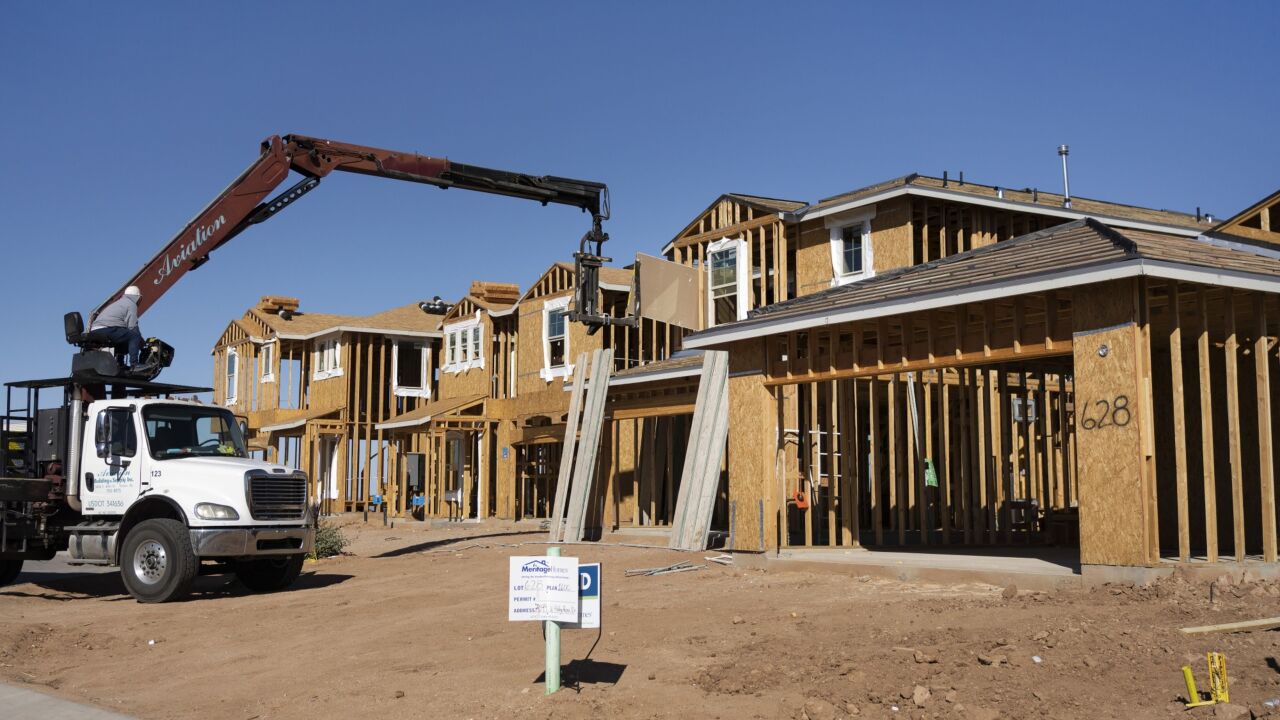U.S. Treasury Secretary Steven Mnuchin has taken pains to stress that the Trump administration isn't out to kill Americans' beloved mortgage-interest tax deduction — but a side effect of the plan could turn it into a perk for only the wealthy.
President Donald Trump has proposed rewriting the tax code to raise the standard federal deduction to a level where about 25 million homeowners would no longer take advantage of the century-old break. A married couple would need a home-loan balance of about $608,000 — almost triple the mortgage on a median-priced U.S. home — before using it would make sense, according to a new analysis by property-data provider Trulia. That would be up from about $322,000 today.
Without the incentives, along with a proposed end to local property-tax deductions, home sales may be hurt in cities where prices are rising quickly and buyers are stretching to afford their purchases, from Denver and Portland, Ore., to Boston and Washington. Reduced demand would weigh on values, causing price declines nationwide, according to the National Association of Realtors, which opposes the change.
The proposal "is a backdoor way of rendering the mortgage interest deduction close to worthless," said Mark Zandi, chief economist for Moody's Analytics Inc.
Americans filing their taxes can either subtract a fixed amount from their incomes, called the standard deduction, or itemize write-offs, including mortgage interest as well as state and local taxes. The administration wants to raise the standard allowance — to $24,000 from $12,700 for a married couple filing jointly — and allow deductions for only home loans and charitable donations, greatly reducing the chances that itemizing would pay off for average taxpayers.
'Apple pie'
A White House spokeswoman, Natalie Strom, said average families would be better off under the proposal. Low- and middle-income households would effectively get a tax cut, "putting more disposable income in their pockets for them to invest in a home, purchase a car, save for their children's college -- any other expense," she said in an email.
Trump's plan, outlined last month in a one-page proposal with few details and no provisions for how it might be paid for, amounts to a wish list. House Republicans came up with their own plan last June, which includes several controversial measures that have gotten a cool reception from the Senate as well as the White House.
Mnuchin called the mortgage break, which will cost the government an estimated $63.6 billion this year, "kind of like apple pie" and reiterated that Trump's tax reforms wouldn't touch it.
"Owning a home is something that's been part of the American dream, and we want to keep it that way," he said on May 1 at the Milken Institute Global Conference in Beverly Hills, Calif.
Fewer itemizers
While Trump may not technically change the deduction, he would probably eliminate its usefulness for all but the most wealthy homeowners, said Joseph Rosenberg, a senior research associate for the nonpartisan Tax Policy Center.
The share of households that itemize would plunge to about 5% from about 30% now, according to a National Association of Realtors estimate. About 8 million families would itemize under Trump's plan, a reduction of about 25 million.
The administration is "selling it as a sort of simplification," said Rosenberg, noting that Americans who switch to the standard write-off wouldn't pay more in taxes. "In some respects, they are embracing the fact that there would be fewer people who itemize and take these deductions."
Taxpayers, however, would lose an incentive to take on mortgage debt, and buyers in expensive markets who are stretching to afford fast-rising home prices may start to re-evaluate how much they're willing to spend. In Denver and Portland, Oregon, for example, potential buyers for about half the listings would no longer be able to justify itemizing because of mortgage interest alone, according to a Trulia analysis. The share is about double the national average of 22% in areas including Dallas, Seattle, Boston, Washington and Sacramento, Calif.
The impact of the switch would be greatest for middle-income renters who are thinking about making the jump to homeownership, according to Ralph McLaughlin, Trulia's chief economist.
Price declines
Prices may fall 10% on average nationwide, taking into account the lack of deduction for state and local property taxes, according to a preliminary estimate prepared by a consultant for the National Association of Realtors. Zandi of Moody's said the proposed deduction changes would reduce prices by about 4% nationally, including the property-tax impact, with bigger decreases in pricier parts of the country.
If the government's tax policy no longer favors homeownership, some renters may decide buying isn't worth the hassle or expense. While buying a house for $517,000 is now cheaper than renting in all 100 markets measured by Trulia, that calculation would change under the Trump plan in 12 areas, including New York City; Portland, Ore.; and Madison, Wis.
Reducing incentives to buy could benefit large publicly traded landlords, including Equity Residential and Avalon Bay Communities Inc., and single-family rental companies such as Blackstone Group LP's Invitation Homes Inc. and Colony Starwood Homes, whose co-chairman, Tom Barrack, was a key Trump supporter.
Economists' view
Economists have long been critical of the mortgage-interest deduction because it disproportionately benefits people with more-expensive properties, including many who would have purchased even without the break. It also inflates home prices because buyers often overestimate their tax savings when they're budgeting for a purchase, said Dennis Ventry, a professor at University of California, Davis, School of Law who has studied the program's history.
Trump's plan might end up boosting homeownership rates over time because a drop in prices would improve affordability and the standard deduction would give buyers more money to spend on a house, Ventry said.
The real estate industry is lining up against the proposal, including the powerful National Association of Realtors, which spent $10.2 million lobbying Congress in the first quarter, more than any other organization except the U.S. Chamber of Commerce, according to the Center for Responsive Politics. William E. Brown, the association's president, said his group isn't just fighting for its members.
"If values fall, it's not just going to impact people who just bought houses, but all current homeowners," Brown said.
Fighting back
Trump's plan also targets tax deductions for state and local taxes paid — a provision that would especially hurt homeowners in states where property taxes are high. Coldwell Banker Realtor Kevin Cascone, who's based in Westfield, New Jersey, took to Facebook on May 3 to persuade his followers to fight back by contacting their legislators: "NEW JERSEY HOMEOWNERS! This should concern you deeply," Cascone wrote. "Regardless of your politics, the terms of this policy could SIGNIFICANTLY affect your wallets come tax season next year."
"One of the big reasons for homeownership is the ability to deduct property taxes," Cascone said. "If that's eliminated, what's the difference between renting and buying?"
Marc Shenkman, president of Priority Financial Network, a lender in Calabasas, Calif., said the vast majority of his customers itemize on their tax returns and would no longer take advantage of the mortgage-interest deduction if Trump's proposal goes through.
"I can't tell you how many people say 'I've got to buy that house because I have to get the deduction,'" said Shenkman, whose firm makes about $1 billion a year in home loans. "It's really a psychological thing more than anything."





